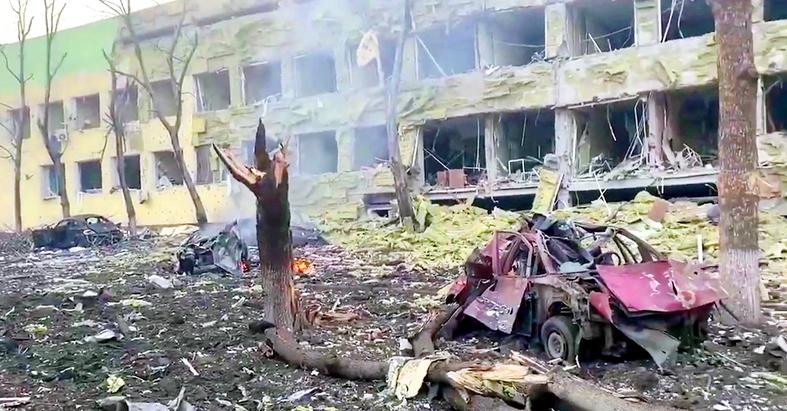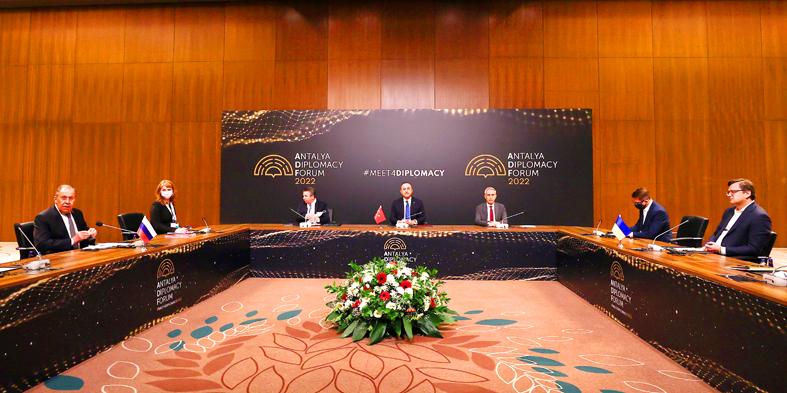Ukraine and Russia yesterday failed to make progress in halting the war and bridging the vast differences between them at the first high-level talks between their foreign ministers since the Russian invasion began.
Russia indicated it would continue attacks until its goals are met, Ukrainian Minister of Foreign Affairs Dmytro Kuleba said after the meeting lasting about 90 minutes with his Russian counterpart, Sergei Lavrov, in Turkey.
“The broad narrative he conveyed to me is that they will continue their aggression until Ukraine meets their demands, and the least of these demands is surrender,” Kuleba said.

Photo: AFP / National Police of Ukraine
Russia is open to serious talks between the two presidents, “but those contacts must have added value,” Lavrov told reporters after the meeting.
Hosted by Turkish Minister of Foreign Affairs Mevlut Cavusoglu in Antalya, it was the most senior in-person meeting between Ukraine and Russia since the Russian invasion began on Feb. 24.
It followed two weeks of war in which Russia’s plans for achieving a rapid military victory have hit increasing difficulties as Ukraine mounts a determined defense, backed by flows of weapons from the US and its allies.

Photo: EPA-EFE / Cem Ozdel / Turkish Ministry of Foreign Affairs
That has prompted Russian President Vladimir Putin to adopt increasingly brutal tactics, with his forces shelling Ukrainian cities to try to break resistance.
Kuleba had set out Ukraine’s three key demands before the meeting with Lavrov — a ceasefire, an improvement of the humanitarian situation in besieged cities and the withdrawal of Russian forces from the country.
Russia did not plan to discuss a ceasefire at yesterday’s talks, because the main negotiations are the ones that have taken place in Belarus, said Lavrov, who gave no commitments on humanitarian corridors for Ukrainian cities.
He insisted that Russia had not invaded Ukraine, but is carrying out what the Kremlin calls a “special military operation” there.
“We want a Ukraine that’s friendly and demilitarized, a Ukraine in which there isn’t a risk of the creation of another Nazi state, a Ukraine where there won’t be a ban on the Russian language, on Russian culture,” Lavrov said.
Russia lacks any political will to end the war and “Putin, in poker terms, has gone all in — so he either wins or he loses,” Estonian Prime Minister Kaja Kallas said in an interview with Bloomberg Television.
“It’s up to everybody to make sure that Putin doesn’t win this war,” she said.
German Chancellor Olaf Scholz and French President Emmanuel Macron yesterday spoke to Putin by phone and reiterated their demand for an immediate ceasefire.
The three leaders agreed to stay in close touch in coming days, a statement from Scholz’s office said.
Ukrainian President Volodymyr Zelenskiy has said he is willing to consider some compromises on Russia’s demand that his country abandons ambitions to join NATO and to adopt a neutral position.
Zelenskiy has also said that “only after the direct talks between the two presidents can we end this war,” and that there has been no direct contact between him and Putin.
Ukraine is insisting on security guarantees from neighbors and allies such as the US, the UK and Germany, and will not cede a “single inch” of its territory to Russia, Ihor Zhovkva, Zelenskiy’s deputy chief of staff, said in a Bloomberg Television interview on Wednesday from Kyiv.
While Ukraine wants a diplomatic solution, “our first and foremost precondition for having such kind of negotiations is immediate ceasefire and withdrawal of Russian troops,” Zhovkva said.

SECURITY: As China is ‘reshaping’ Hong Kong’s population, Taiwan must raise the eligibility threshold for applications from Hong Kongers, Chiu Chui-cheng said When Hong Kong and Macau citizens apply for residency in Taiwan, it would be under a new category that includes a “national security observation period,” Mainland Affairs Council (MAC) Minister Chiu Chui-cheng (邱垂正) said yesterday. President William Lai (賴清德) on March 13 announced 17 strategies to counter China’s aggression toward Taiwan, including incorporating national security considerations into the review process for residency applications from Hong Kong and Macau citizens. The situation in Hong Kong is constantly changing, Chiu said to media yesterday on the sidelines of the Taipei Technology Run hosted by the Taipei Neihu Technology Park Development Association. With

CARROT AND STICK: While unrelenting in its military threats, China attracted nearly 40,000 Taiwanese to over 400 business events last year Nearly 40,000 Taiwanese last year joined industry events in China, such as conferences and trade fairs, supported by the Chinese government, a study showed yesterday, as Beijing ramps up a charm offensive toward Taipei alongside military pressure. China has long taken a carrot-and-stick approach to Taiwan, threatening it with the prospect of military action while reaching out to those it believes are amenable to Beijing’s point of view. Taiwanese security officials are wary of what they see as Beijing’s influence campaigns to sway public opinion after Taipei and Beijing gradually resumed travel links halted by the COVID-19 pandemic, but the scale of

A US Marine Corps regiment equipped with Naval Strike Missiles (NSM) is set to participate in the upcoming Balikatan 25 exercise in the Luzon Strait, marking the system’s first-ever deployment in the Philippines. US and Philippine officials have separately confirmed that the Navy Marine Expeditionary Ship Interdiction System (NMESIS) — the mobile launch platform for the Naval Strike Missile — would take part in the joint exercise. The missiles are being deployed to “a strategic first island chain chokepoint” in the waters between Taiwan proper and the Philippines, US-based Naval News reported. “The Luzon Strait and Bashi Channel represent a critical access

Pope Francis is be laid to rest on Saturday after lying in state for three days in St Peter’s Basilica, where the faithful are expected to flock to pay their respects to history’s first Latin American pontiff. The cardinals met yesterday in the Vatican’s synod hall to chart the next steps before a conclave begins to choose Francis’ successor, as condolences poured in from around the world. According to current norms, the conclave must begin between May 5 and 10. The cardinals set the funeral for Saturday at 10am in St Peter’s Square, to be celebrated by the dean of the College